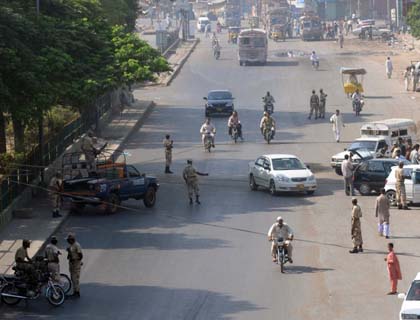Civil war, drone killings, tar get killing, sectarianism, ethnic violence, extremism and regionalism have endangered the national unity of Pakistan. The country is now in danger and stands at the verge of collapse. The killing of innocent civilians by their own army, their own police and hidden hands raise many questions. The recent failure of law enforcement agencies and army to control ethnic and sectarian violence across the country has deeply been criticized by civil society. Target killings in both Khyber pakhtunkhwa and Baluchistan by US drone and Pakistan's F16 and the unending civil war in Afghanistan have already divided the country on ethnic and sectarian lines.
The state has failed, collapsed or hijacked by the supreme court of the country. Normally, on all minor or bigger issues, people demand the Supreme Court for suo moto action because state institutions either collapsed or lost their administrative credibility. In Karachi alone, as there is no rule of law, provincial government has lost control of many districts.
In 2011, there were 1,048 terror related incident in the city that left one thousand civilian and 65 security forces personnel dead. The inconsiderate policies of previous governments resulted in the reorganization of sectarian infrastructure in a new form. The arrest of some members of sectarian groups recently opened up some important revelations before the police about the future role of these groups.
Target killing in Karachi has been a highly destructive phenomenon since the 1980's. Both former President General (retd) Pervez Musharraf and President Asif Ali Zardari agree on the point that terror networks across the country were deliberately created and nurtured in the past. Karachi's violent landscape has long been scarred by ethnic and sectarian violence. The recent target killings in Karachi and the networks of private militias, their way of killing and torturing innocent citizens astonished the whole world.
Though there have been different roots of violence in the city, the primary roots are considered to be unchecked and unregulated religious schools that introduced suicide attacks against civilian and military targets. A majority of these schools have employed teachers from banned organizations such as Jaish-e-Mohammed, Sipah-e-Sahaba, Pashtun Taliban, Punjabi Taliban and Lashkar-e-Jhangvi. In 2010, police arrested a few Taliban fighters while thousands more suspected members of Jundullah, the Badar Mansoor group, Kharooj, the Al-Mukhtar group, Punjabi Taliban, Asian Tigers, Lashkar-e-Jhangvi Al-Alami, Jundul Hafsa, Al-Furqan and Al-Qataal are still killing innocent people, collecting illegal taxes, and are involved in robbery, theft and looting.
Terror attack on Pakistan navy and army highlights the capability of these terrorist groups to penetrate deep inside society. Improvised explosive device are prepared in Karachi in large quantity. Islamic Jihad Union and the militant networks of Indonesia, Philippine, Thailand and Bangladesh receive training from various sources in Karachi. Last year, terrorists, who were arrested in Karachi, revealed that numerous international terror groups are operating there. In January 2012, Rehman Malik revealed that a group from Gilgit (Gilgiti Group Squad) was found involved in terror related incidents in Karachi.
The PKK and Khrasan Mujahideen (A group of Mujahedeen based in Pakistan who claim to be member of Caucasus Mujahedeen networks) have their own networks there while Afghan war criminals and warlords provide sophisticated weapons to both ANP and MQM workers.
Shurat al Mujahideen Fee Junubu and members of the above mentioned groups are also operating in Kunar and Nuristan provinces of Afghanistan. Black water plays its own specific role. Indian and Iranian intelligence have established strong networks there. Interior Minister Rehman Malik recently claimed that arms and ammunition are being transported to Karachi from Afghanistan. Training camps for Baloch terrorists are also operating in Afghanistan, Malik said.
The BLA and AKR are operating in specific areas. As international security experts have already warned about the smuggling networks of Afghan, Irani and Pakistani smugglers who smuggle drugs and arms from Central Asia, the Middle East and Iran into Karachi, police and security agencies have so far failed in tracking down their local connections. A secret document in Karachi recently revealed that Sri Lankan terror group, LTTE, had established an arms smuggling network in Karachi on September 14, 2009.
Terrorists arrested in Karachi in August 2011 revealed a frightening story of killing, torture and arms smuggling. Their links with drug and land mafias and the emergence of terror networks in schools, colleges and universities is another misadventure faced by the government. In May 2011, an arrested student of Karachi University told the police investigation team that hundreds of his colleagues were fighting on ethnic lines. Another source confirmed a big terror network organized in Karachi University, NED University, and Dawood College of Engineering and Technology.
In addition to colleges and universities, the network of terrorist groups in Karachi prisons amply spread disillusion and fear in the police department. This network receives financial support from outside. Notwithstanding Interior Minister Rehman Malik's assurance that police found major clues to the target killers, violence still swallows up innocent citizens in Karachi. The killings of innocent Hazaras in Balochistan are another tragic story.
In March 2012, terrorists killed several members of Hazara community in Quetta. Terrorists targeted a van carrying Hazaras and killed many passengers. On March 28, 2012, Hazara coal mine workers were targeted in Dasht of Mastung district. In October 2011, over 40 Hazaras were brutally killed in Baluchistan.
As far as terror finance is concerned, the UK-based Pakistani ethnic and sectarian groups channel a huge amount of money through fake IDs to their respective groups in Karachi. This illegal transaction of money plays a major role in the purchase of arms and ammunition for ethnic and sectarian terrorists. To save the state of Pakistan, army and other law enforcement agencies have moral obligation to intercept the day to day killing of innocent civilians either by their own people or US drones.

